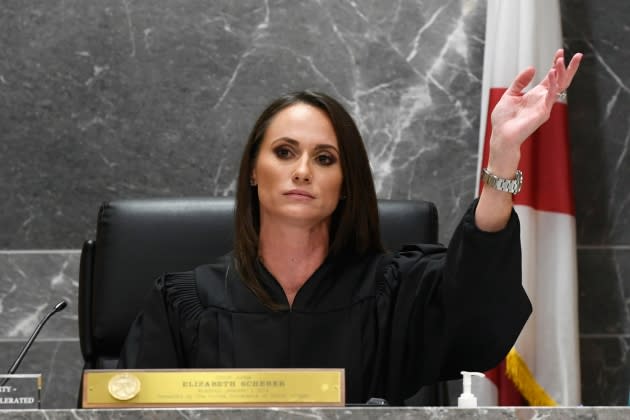Florida Supreme Court Reprimands Judge For Showing Bias During Parkland Shooting Trial

Back in November, Judge Elizabeth A. Scherer sentenced Nikolas Cruz to life in prison without parole for killing 17 people in the 2018 mass shooting at Marjory Stoneman Douglas High School in Parkland, Florida. Now, nearly nine months later, the judge has received a public reprimand from the Florida Supreme Court for violating several rules governing judicial conduct, including showing bias towards the prosecution throughout the trial.
“At the conclusion of the sentencing hearing, you stepped down from the bench
in your judicial robe and embraced members of the prosecution team. You also embraced
victims and family members of the victims,” read the notice of formal charges.
More from Rolling Stone
YNW Melly Murder Trial Declared a Mistrial as Jury Deadlocks on Verdict
Long Island Serial Killer: More Cities Investigating if Unsolved Murders Link to Suspect
Tupac Shakur: Police Search Home of Man Who Claims to Have Witnessed Murder
The notice was issued by the Florida Judicial Qualifications Commission, which said it had unanimously found that “probable cause exists for formal proceedings to be instituted” against Scherer. The panel added that her conduct was “at times, intemperate and gave the appearance of partiality to the prosecution.”
The trial, which lasted three months — after taking three years to finally begin — included graphic photos and videos from the massacre, heart-wrenching testimony from survivors and family members of the victims, and a tour of the blood-stained Florida school where the shooting took place.
In the notice of formal charges, Scherer was criticized for not stopping those family members from directing “vitriolic comments” at the defense. The document acknowledged that the judge did make note that some comments were inappropriate, but added that she failed to “enforce the prosecution’s obligations.”
Other complaints within the notice reference the fraught relationship between Scherer and Cruz’s lead public defender Melisa McNeill, stating that the judge “denied the elected Public Defender’s request for a brief recess to consult with members of the defense team.”
During the trial, the pair locked into a screaming match when lawyers for Cruz abruptly rested their case after calling 25 witnesses — far less than the 80 they’d reportedly planned to call over 11 days. Scherer stated that McNeill had wasted the jury’s time “as if it is some kind of game,” to which she fired back: “You are insulting me on the record in front of my client.”
Scherer responded: “You’ve been insulting me the entire trial. Blatantly taking your headphones off, arguing with me, storming out, coming late intentionally if you don’t like my rulings. So, quite frankly, this has been long overdue.” The dispute took place prior to the jury entering the courtroom.
The notice regarding Scherer’s conduct included another description of a contentious exchange between Scherer and a member of the defense team. “A member of the defense team stated, ‘Judge, I can assure you that if they were talking about your children, you would definitely notice.’ You responded by accusing him of trying to threaten your children. You told him he violated ‘about every rule of professional responsibility’ and ordered that he leave the defense table and sit in the back of the courtroom effectively denying him the ability to represent his client.”
The initial stipulation submitted in the Supreme Court of Florida on June 2 states that Scherer “waives her right to further hearings if this Stipulation and the attached Findings and Recommendation of Discipline are accepted.” The public reprimand was officially issued on July 24.
Best of Rolling Stone

